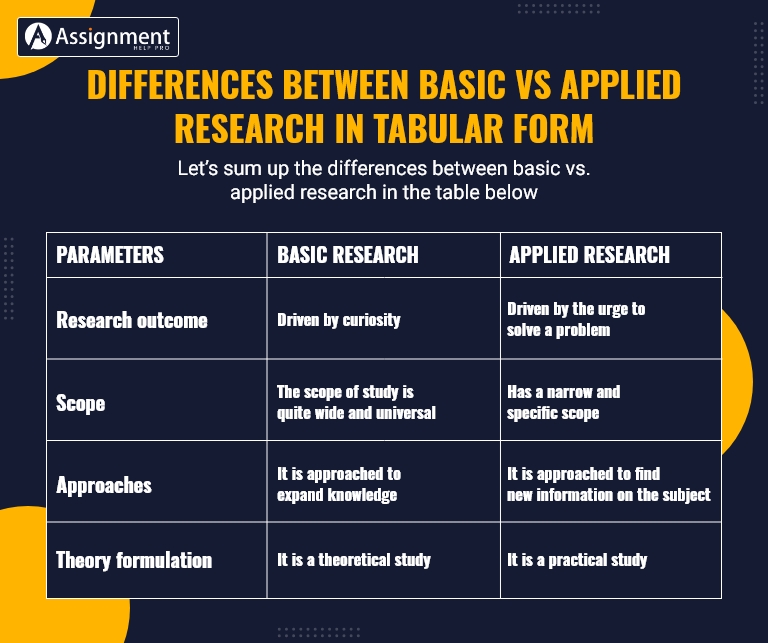Are you aware of the difference between basic and applied research? Don’t worry, if you have no idea about it. In general, the majority of the students pursuing advanced education experience difficulties in understanding the different types of research methods. Also, in specific, some students really like to know about basic vs. applied research. If you are also one such student who is interested in expanding your knowledge of research methodologies, then this blog is for you.
In simple terms, research indicates studying a subject in detail to find out new information or get a deeper understanding. Research is an essential part of post-graduation and doctoral, studies. Apart from that, various business organizations perform market research before launching a new product or service. But, are all these research the same? Definitely not, the research conducted for academic purposes is of two types – basic and applied. Basically, these two research types are completely different, yet they cross at one point.
Here, in detail, let us have a closer look at the comparative analysis of basic and applied research.
What is Basic Research?
Basic research, popularly known as pure or fundamental research enhances scientific knowledge of concepts and theories of a subject, topics, or natural phenomena. It helps to expand the fundamental understanding of the subject based on the existing subject literature.
However, basic research does not solve any specific issue. Instead, it studies different behaviors. Therefore, it is an essential part of all subjects of study. Hence, it is usually used to feed the curiosity of the researcher and is not conducted with any specific purpose in mind. Answers to questions like “how,” “why,” and “what” are found through basic research. Moreover, it does not add any commercial value to the finding but rather acts as a foundation for other projects to develop solutions or solve problems.
You can take its help to collect evidence for supporting a claim or disapproving of it or explain how specific concepts or theories work. Although basic research is performed scientifically, searching for a newly learned term on a search engine or in reference books is also known as basic research.
What is Applied Research?
Fundamental research is just the opposite of basic research. It involves finding the solution to the practical and existing problems of the community or a subject. Empirical methods like experiments are one of its most common tools to gather more data on any area of study. The findings gathered through this research can answer a specific question to complete a study. Usually applied research is used to involve natural sciences in practical life. Fundamental research aims to improve human living conditions. It is of two types:
- Action research – It collects the guidelines for providing practical solutions.
- Evaluation research – It examines existing research to make an informed decision
Basic vs. Applied Research: Advantages
Find here the advantages of both basic and applied research.
Advantages of Basic Research
Diversifying knowledge through basic research has multiple advantages. Some of the most common ones include:
- Understand the system and processes of life
- Prepare for the future by empowering society to deal with unknown issues
- Laying the foundation for applied research
Advantages of Applied Research
Apart from acting as a catalyst to resolve existing problems, applied research has multiple advantages. It includes:
- Saving resources to make better decisions
- Opening path to building new objectives
- Finding new solutions
- Offering equitable data by examining experiential pieces of evidence
Basic vs. Applied Research: Examples
The following are some common examples of basic and applied research.
Example of Basic Research
Here are some prominent examples of basic research
- Study the impacts of alcohol on the human brain.
- Research the components of human DNA.
- Analyze the impact of increased stress on aggression.
- Explore if gender stereotypes lead to cause depression
- What are the causative factors of cancer?
- Examine how oak trees grow
- How to improve the drainage system of the USA?
- Is a vegan diet associated with a healthier life?
- Can the minting of cryptocurrency safely affect nature?
Examples of Applied Research
Here are some examples of potential applied research scenarios:
- How to improve adolescent education in the USA?
- A study of the market products for millennial
- How to encourage students to pursue postgraduate studies?
- What can be done to make car tires last longer?
- Ways to maintain a gluten-free diet on a low budget
- Best ways to treat insomnia patients
- How to retain patients with dental issues?
- Easiest ways to detect patients with schizophrenia
- How to prevent itching from mosquito bites?
- Best ways to analyze the marketing strategies to attract more students to college
Read more: Best Accounting Research Topics and Ideas for Students
Major Difference Between Basic vs. Applied Research
Though both basic and applied research are used for searching specific information, they have notable differences. Some of the most common ones are in the following fields:
Research outcomes
- Basic research: Basic research is curiosity-driven. They are primarily self-initiated to derive knowledge on the subject and theories.
- Applied research: It is directed toward finding the answer to a specific problem. Most often, it is conducted to help improve issues, products, or services.
Scope of research
- Basic research: The scope of research is quite wide; it applies to various concepts to get better knowledge on the subject. Basic research methods include digging deep into various subjects to offer more information that will link different points in a larger body of data.
- Applied research: The scope of this research is quite narrow to collect precise evidence to solve a specific problem.
Research approaches
- Basic research: It fills the gaps between existing research.
- Applied research: It helps to find new information, typically in the form of a solution.
Read more: What are the Different Types of Research Methods?
Theory formulation
- Basic research: It is based on a subject theory. Theories may develop and change as researchers discover more information during the research.
- Applied research: It is practical since it aims to solve problems.

Basic vs. Applied Research- Comparison in Tabular Form
Let’s sum up the differences between basic and applied research in the table below:
| Parameters | Basic Research | Applied research |
| Research outcome | Driven by curiosity | Driven by the urge to solve a problem |
| Scope | The scope of the study is quite wide and universal | Has a narrow and specific scope |
| Approaches | It is approached to expand knowledge | It is approached to find new information on the subject |
| Theory formulation | It is a theoretical study | It is a practical study |
Basic vs. Applied Research: Similarities
Now that you know the major differences between basic and applied research, you may never imagine that there could be any similarities between the two. However, if looked closely, you might find only two prominent similarities. It includes:
- Data collection methods: Both types of research use similar methods to derive data; interviews, surveys, and survey groups are a few common ones.
- Reasoning: Research is used as the base for inductive and deductive reasoning to build hypotheses in both types of research and prove them. However, they intersect at the point where basic research is the foundation for applied research.
Basic vs. Applied Research: Which One To Choose?
Basic and applied research is used to gain more knowledge. However, using both these types of research under the same circumstance is often impossible. The best way to decide which type of research to use, find out the goal of performing the research first. For example, while writing an essay, thesis, or dissertation, basic research is useful. However, applied research is more effective for developing a doctoral research paper, or a case study. It is also useful for market research in business organizations.
Conclusion
Hopefully, by now, from this blog, you will have gained a better understanding of the difference between basic and applied research. However, if you struggle to understand the best research method for your academic work or lack the research skills required for preparing a paper, approach us immediately.



